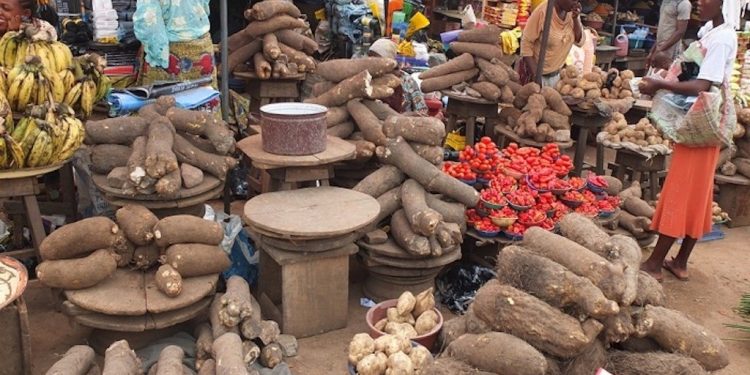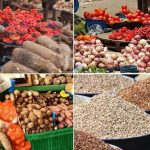Despite a recent decline in food inflation across Nigeria, residents of the Federal Capital Territory (FCT), Abuja, say they have yet to experience meaningful relief in their daily lives. While some staple food prices have dropped, low purchasing power and stagnant incomes continue to weigh heavily on household budgets.
A field survey by the News Agency of Nigeria (NAN) across major markets in Abuja, including Lugbe, Nyanya, and Orange Market, revealed that most residents still struggle to afford basic food items. At Orange Market, traders reported mixed trends: the price of a dustbin basket of tomatoes has fallen to between N5,000 and N6,500 from N7,500 in September, while pepper dropped significantly from N3,000 to N1,500 per basket. Conversely, onions increased slightly to N4,500 from N3,500–N4,000, and pepper rose to N5,500 from N3,500.
In Lugbe Market, tomatoes now sell for around N9,000 per dustbin basket, onions for N6,500, pepper for N2,000 per plate, and a mudu of beans averages N1,800, down from N2,500 earlier in the year. Prices of Big Bull rice have fallen from N95,000 to N55,000 per 50kg bag, while Optimum rice decreased to N56,000 from N65,000. Yams also saw a drop, with five medium tubers selling for about N8,000 compared to N15,000 in August.
Nyanya Market showed similar trends: onions are now between N3,500 and N4,500 per basket, down from N6,000, while tomatoes sell for N3,500–N5,000 depending on size and freshness.
For many residents, the moderation in food prices has done little to ease financial strain. Mr. John Okeke, a civil servant, questioned whether the economy is truly improving:
“If food prices have dropped, are they affordable to the common man? Has transport reduced? Has fuel been reduced? We must consider all these before claiming that the economy is improving,” he said.
Mrs. Agnes Edoh, a nurse and mother of three, added that households remain under severe pressure despite the reductions. “Even with this reduction, many people are struggling. After paying rent, school fees, transportation, and other expenses, there is little left for household needs. The government should review workers’ salaries and provide more income-support measures,” she said.
The Minister of State for Agriculture and Food Security, Mr. Aliyu Sabi, attributed the recent price drops to increased local production and government intervention programs, including the dry-season farming initiative and subsidized fertilizer distribution.
However, economic analysts warn that lower food inflation has yet to translate into tangible relief. Dr. Tunde Akinsola, an economist based in Abuja, said, “Nominal prices might have reduced slightly, but the purchasing power of the average household has not improved. Without income growth or welfare support, the benefits of lower inflation remain largely on paper.”
Ibrahim Anas, a policy researcher at the University of Abuja, echoed this view, noting, “Wages remain very low, while the cost of living in Abuja continues to rise. Most residents are not feeling the effects of these lower inflation numbers.”
Nigeria’s headline inflation slowed to 18.02% in September 2025, down from 20.12% in August 2025, according to the National Bureau of Statistics (NBS). Food inflation for the same period stood at 16.87% year-on-year, a significant drop from 37.77% in September 2024.
While these figures suggest progress on paper, for millions of residents in Abuja, the reality remains challenging: lower prices have yet to translate into affordability or improved welfare.










